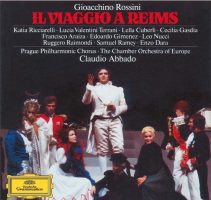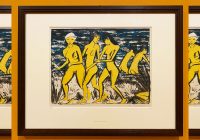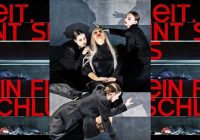Il Viaggio a Reims – Deutsche Oper Berlin
Von Holger Jacobs
16.06.2018
english text below
Opera Bouffa von Rossini als Zauberberg Sanatorium mit fröhlichen Patienten
Wertung: 🙂 🙂 🙂 (drei von fünf möglichen)
Hintergrund 1
Die Premiere am Freitag Abend in der Deutschen Oper bildete den Auftakt zu einem Marathon der Opernpremieren in Berlin. Alle drei staatlichen Opernhäuser bringen an diesem Wochenende ihre letzten Premieren der Saison – die Komische Oper folgt am Samstag und die Staatsoper am Sonntag.
Anzeige
![]() empfiehlt Pierre Boulez Saal in Berlin
empfiehlt Pierre Boulez Saal in Berlin
Hintergrund 2
Gioachino Rossini, 1792 als Sohn eines Musikers im italienischen Pesaro geboren, brachte die Opera Bouffa Anfang des 18. Jahrhunderts in Paris zu ihrem Höhepunkt. Die Opera Bouffa bezeichnete in Italien eine lustige Oper im Gegensatz zur Opera Seria, der ernsten Oper. Häufig wurde die Opera Bouffa auch als Oper der einfachen Leute, des so genannten „Dritten Standes“ (nach Klerus und Adel), bezeichnet. In Paris aber hatte sie Anhänger in allen Kreisen der Bevölkerung. Die Oper „Il Viaggio a Reims“ war sogar eine Auftragsarbeit an Rossini für die Krönung von Charles X. Bei der Uraufführung 1825 war der König zugegen.
Handlung
Die Oper „Il Viaggio a Reims“ von Rossini weist einige Besonderheiten auf: Erstens ist sie in einem einzigen Akt geschrieben, der ganze 3 Stunden dauert (längster Akt der Operngeschichte). Zweitens gibt es keine richtige Handlung, sondern nur 15 (laut Wikipedia sogar 25) mehr oder weniger kurze Szenen, in denen eine aus vielen Nationen zusammengewürfelte Gruppe von Reisenden sich in einem Hotel in den französischen Vogesen durch Zufall zusammen findet, um am nächsten Tag zur Krönung Charles X. nach Reims zu fahren. Dabei spielen 10 Personen die Hauptrollen, weitere 8 in Nebenrollen.
Da wären einmal die römische Künstlerin Corinna )Sopran) – das Libretto geht übrigens auf den französischen Roman „Corinne ou L’Italie“ der Madame de Stael zurück-, die polnische Adlige Marchesa Melibea (Alt), die Französin Contessa di Folleville (Sopran), Madame Cortese aus Tirol (Sopran), der französische Offizier Cavalière Belfiore (Tenor), der russische General Conte di Libenskof (Tenor), der englische Oberst Lord Sidney (Bass), der Literaturprofessor Don Profondo (Bass), der deutsche Major Barone di Trombonok (Bass) und der spanische Admiral Don Alvaro (Bass). Während des Stücks agieren und reagieren die Akteure miteinander; mal geht es um Eifersucht, mal hat die Französin ihre Kleider verloren, mal beschwert sich ein anderer über dieses oder jenes. Am Schluss gibt es ein großes Finale zur Huldigung des Königs.
Das Kulturkaufhaus Dussmann empfiehlt:
Die Aufzeichnung auf Audio-CD vom Rosini Festival in Pisaro 1984 mit Claudio Abbado am Dirigentenpult und dem Chamber Orchestra of Europe. Mit: Cecilia Gasdia als Corinna, Francisco Araiza als Conte di Libenskof, Katia Ricciarelli als Madama Cortese, Lucia Valentini Terrani als Marchesa Melibea, Ruggero Raimondi als Don Profondo, Samuel Ramey als Lord Sidney, Enzo Dara als Barone di Trombonok, Leo Nucci als Don Alvaro und Lella Cuberli als Contessa di Folleville:
Kritik
Der Vorhang geht auf und ein auf allen Seiten verspiegelter Schlafsaal eines Sanatoriums wird sichtbar. Sofort kommt einem Thomas Manns „Zauberberg“ in den Sinn. Im Programmheft wird sogar explizit darauf hingewiesen. Der Charme einer französischen Herberge kommt dabei allerdings nicht auf. Eher kühle Distanz. Anschließend geben sich alle Sängerinnen und Sänger auf der Bühne jegliche erdenkbare Mühe die Distanz wieder schwinden zu lassen, um die Fröhlichkeit und auch Verrücktheit der Reisenden dem Publikum so nahe wie möglich zu bringen. Was ihnen auch teilweise gelingt. Ausgezeichnete Stimmen (besonders positiv viel mir Elena Tsallagova als Corinne und Hulkar Sabirova als Madame Cortese auf) und eine wunderschöne Musik, die nicht von ungefähr Rossini damals zum bekanntesten Opernkomponisten in Paris machte.
Doch ein Problem gibt es, und dafür kann auch der Regisseur Jan Bosse nichts: Das Libretto ist dermaßen banal, dass schon damals nach der Premiere 1825 der Kritiker Castil-Blaze im Journal des Débats schrieb: „Der Text ist ohne Handlung und eigentlich uninteressant“…. Il Viaggio a Reims ist eine Oper in einem Akt, die drei Stunden dauert, und die mangelnde Handlung lässt sie noch länger erscheinen“. Selbst der König soll sich gelangweilt haben. Und so ging es mir leider auch. Schon nach der ersten Stunde musste ich ein Gähnen unterdrücken…
Nach drei Aufführungen wurde die Oper 1825 wiedereingestellt und viele Kompositionen aus der Partitur übernahm Rossini später für seine Oper „Le Comte Ory“. Die Noten verschwanden spurlos und wurden erst 1970 durch Zufall wiederentdeckt. Beim Rossini Festival in Pesaro 1985 kam es unter dem Dirigat von Claudio Abbado zur Wiederaufführung. Und jetzt in der Deutschen Oper Berlin.
Es bleibt also das Geheimnis von Deutsche Oper Intendant Dietmar Schwarz, warum er ausgerechnet diese Oper von Rossini wählte und z.B. nicht die nach „Il Barbiere di Siviglia“ (läuft seit 2009 in der Deutschen Oper) zweit beliebteste Rossini-Oper „La Cenerentola“ aussuchte.
Was den Abend aber auszeichnete waren die Musik (Dirigent: Giacomo Sagripanti), die Bühne mit ihren Lichteffekten und Video-Einspielungen (Bühne: Stéphane Laimé) und die lustigen Kostüme (Kathrin Plath). In einer Szene ziehen die Protagonisten ihre langen Gewänder aus und darunter kommen Fußball Shorts in den Nationalfarben der Länder hervor – wie gerade bei der Fußballweltmeisterschaft in Russland. Und großes Lob auch an die Dramaturgie, die ein Programmheft gestaltete, welches so klar strukturiert und informativ war, wie ich es selten erlebt habe.
Musikalische Leitung: Giacomo Sagripanti, Inszenierung: Jan Bosse, Bühne: Stéphane Laimé, Kostüme: Kathrin Plath, Dramaturgie: Lars Gebhardt
Mit: Elena Tsallagova, Vasilisa Berzhanskaya, Sioghan Stagg, Hulkar Sabirova, Gideon Poppe, David Portillo, Mikheil Kiria, Davide Luciano, Philipp Jekal, Dong-Hwan Lee, Sam Roberts-Smith.
Il Viaggio a Reims
Deutsche Oper Berlin
Nächste Vorstellungen: 22., 24. und 30. Juni, 5. Juli 2018
english text
Il Viaggio a Reims at the Deutsche Oper Berlin
By Holger Jacobs
06/16/2018
Opera Bouffa by Rossini as Zauberberg sanatorium with happy patients
Background 1
The premiere on Friday evening at the Deutsche Oper formed the prelude to a marathon of opera premieres in Berlin. All three state opera houses are bringing their latest premieres of the season this weekend – the Komische Oper follows on Saturday and the Staatsoper on Sunday.
Background 2
Gioachino Rossini, born the son of a musician in Pesaro, Italy in 1792, brought the opera bouffa to a climax in Paris at the beginning of the 18th century. The Opera Bouffa described in Italy a funny opera in contrast to the Opera Seria, the serious opera. Frequently, the Opera Bouffa was also called the opera of the common people, the so-called „Third Estate“ (after clergy and nobility). But in Paris she had followers in all circles of the population. The opera „Il Viaggio a Reims“ was even a commissioned work on Rossini for the coronation of Charles X. At the premiere in 1825, the king was present.
Story
The opera „Il Viaggio a Reims“ by Rossini has some peculiarities: First, it is written in a single act that lasts a full 3 hours (the longest act of opera history). Secondly, there is no real action, but only 15 (or even 25, according to Wikipedia) more or less short scenes, in which a group of travelers ruffled together in a hotel in the French Vosges by chance coincides to arrive the next day Coronation Charles X. to drive to Reims. 10 people play the main roles, another 8 in supporting roles. There are the Roman artist Corinna (soprano) – the libretto goes back to the French novel „Corinne ou L’Italie“ of Madame de Stael -, the Polish nobles Marchesa Melibea (alto), the Frenchwoman Contessa di Folleville (soprano) , Madame Cortese from Tyrol (soprano), the French officer Cavalière Belfiore (tenor), the Russian general Conte di Libenskof (tenor), the English colonel Lord Sidney (bass), the literature professor Don Profondo (bass), the German major Barone di Trombonok (bass) and the Spanish admiral Don Alvaro (bass).
During the play the actors interact and react with each other; sometimes it’s about jealousy, sometimes the Frenchwoman has lost her clothes, sometimes someone complains about this or that. At the end there is a grand finale to the homage of the king.
Critics
The curtain opens and a sanatorium dormitory mirrored on all sides becomes visible. Immediately a Thomas Mann’s „Magic Mountain (Zauberberg)“ comes to mind. The program even explicitly mentions this. However, the charm of a French hostel does not come up. Rather cool distance. Afterwards, all singers on the stage make every imaginable effort to let the distance disappear in order to bring the happiness and also the craziness of the travelers as close as possible to the audience. What they partially succeed. Excellent voices (especially positive to me Elena Tsallagova as Corinne and Hulkar Sabirova as Madame Cortese) and a beautiful music that made not by accident Rossini the most famous opera composer in Paris at that time.
But there is a problem, and even director Jan Bosse is responsable for it: The libretto is so trivial that already after the premiere in 1825 the critic Castil-Blaze wrote in the Journal des Débats: „The text is without action and actually uninteresting …. Il Viaggio a Reims is an opera in an act that lasts three hours, and the lack of action makes it appear even longer „. Even the king should have bored. And so I was, too. Already after the first hour a yawn slipped out …
After three performances in 1825, the „Il Viaggio..“ was finished and many compositions from the partitur Rossini later took over for his opera „Le Comte Ory“. The notes disappeared without a trace and were only rediscovered by accident in 1970. At the Rossini Festival in Pesaro in 1985 it was re-performed under the conductor Claudio Abbado. And now in the Deutsche Oper Berlin.
It remains the secret of Deutsche Oper director Dietmar Schwarz, why he just chose this opera by Rossini and not the second most popular opera by Rossini, „La Cenerentola“ (after „Il Barbiere di Siviglia“, running since 2009 in the Deutsche Oper).
However, the evening was positive marked by the great music (conductor: Giacomo Sagripanti), the interesting stage with its light effects and video recordings (stage design: Stéphane Laimé) and the funny costumes (Kathrin Plath). In one scene, the protagonists take off their long robes and beneath them football shorts appear in the national colors of the countries – just like at the football World Cup in Russia. And great praise to the dramaturgy, which designed a program, which was so clearly structured and informative, as I have rarely seen.
Musical direction: Giacomo Sagripanti, Direction: Jan Bosse, Stage: Stéphane Laimé, Costumes: Kathrin Plath, Dramaturgy: Lars Gebhardt
With: Elena Tsallagova, Vasilisa Berzhanskaya, Sioghan Stagg, Hulkar Sabirova, Gideon Poppe, David Portillo, Mikheil Kiria, Davide Luciano, Philip Jekal, Dong-Hwan Lee, Sam Roberts-Smith.
Il Viaggio a Reims – DeutscheOper Berlin
Next performances: 22, 24 and 30 June, 5 July 2018
Author: Holger Jacobs
Founder & Editorial Director of kultur24.berlin ug.
Founder & Editorial Director of kultur24 TV on Youtube.
Former correspondent for fashion in Paris.
Photographer, writer and filmmaker.













